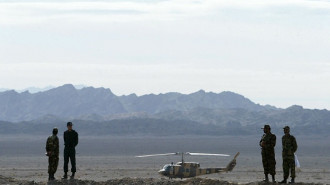The US pulled back 50 to 100 "special operators" from Syria's northern frontier, where they have served as a buffer between the Turkish military and the Kurdish-led Syrian Democratic Forces, after Trump's surprise announcement in advance of an expected operation ordered by Ankara.
In a day of foreign policy turmoil, Trump came under heavy criticism from top Republicans for abandoning the Kurds, who were crucial in the years-long campaign to defeat Islamic State.
Trump appeared to then backpedal, warning Ankara he would "obliterate" the country's economy if they went too far -- without explaining what that meant.
"I have told Turkey that if they do anything outside of what we would think is humane... they could suffer the wrath of an extremely decimated economy," he said.
However Trump also said he wanted to end the US military presence in the region.
"We want to bring our troops back home from these endless wars and we're like a police force. We're not fighting. We're policing."
A senior administration official denied Trump had given a "green light" to an invasion, which raised the threat that thousands of Islamic State fighters that the Kurds hold prisoner could be freed amid a fresh conflict.
"It appears the Turks are intent on some sort of military operation," the official said on grounds of anonymity, adding: "There will be no US armed forces involvement."
US allies abandoned?
Even Trump's allies accused him of turning his back on the Kurds, who say they lost some 11,000 fighters taking the lead in the battle against the Islamic State.
"A precipitous withdrawal of US forces from Syria would only benefit Russia, Iran, and the Assad regime," said Senate Majority leader Mitch McConnell, one of the senior Republicans who criticized Trump.
"And it would increase the risk that ISIS and other terrorist groups regroup," he said.
Turkish President Recep Tayyip Erdogan said on Monday that the operation could "come any night without warning," while Kurds in the area girded for fighting.
"The prudent should prepare for war," said Mustefa Bozan, a 79-year-old shopkeeper in Ras al-Ain, where a contingent of US Special Forces had been until early on Monday.
The Kurds lead the Syrian Democratic Forces, who were essential in the US-led coalition that defeated the Islamic State.
Turkey regards Kurdish forces within the SDF as a terror threat because it maintains ties to Kurdish militants inside Turkey, and has vowed to crush them.
Ankara says it wants to establish a "safe zone" on the Syrian side of the border where it could send back some of the 3.6 million refugees from the eight-year civil war.
Kurds argue that Ankara's goal is to dilute their dominance in the region with an influx of mostly Sunni Arab refugees now living in southwestern Turkey.
Pentagon warns of destabilization
Trump's announcement appeared to have caught many US officials by surprise, and they spent Monday seeking to discourage Ankara from acting.
Pentagon spokesman Jonathan Hoffman warned Turkey of destabilizing blowback to the region if it invades.
"The Department of Defense made clear to Turkey - as did the president - that we do not endorse a Turkish operation in Northern Syria," he said.
SDF spokesman Mustefa Bali said Washington's decision "is about to ruin the trust and cooperation between the SDF and US."
"As the Syrian Democratic Forces, we are determined to defend our land at all costs," the group said.
A Turkish attack raised the specter of some 10,000 Islamic State fighters currently held by the SDF being let loose if SDF soldiers have to battle Turkish troops.
Around 2,000 of them are IS "foreign fighters", and Trump assailed US allies in Europe for not taking back their nationals.
If they escape or are released, the could reconstitute the Islamic State, less than one year after it was defeated and its "caliphate" disintegrated.
Trump declared that it would be the responsibility of Turkey and other countries to deal with the IS prisoners.
"Turkey, Europe, Syria, Iran, Iraq, Russia and the Kurds will now have to figure the situation out, and what they want to do with the captured ISIS fighters in their 'neighborhood,'" he said, using another acronym for the jihadists.
Fearing yet another chapter of bloodshed and mass displacement, the United Nations said it was "preparing for the worst."
The European Union warned that civilians would once again bear the brunt of a military assault.
Follow us on Twitter: @The_NewArab

![Palestinians mourned the victims of an Israeli strike on Deir al-Balah [Getty]](/sites/default/files/styles/image_684x385/public/2024-11/GettyImages-2182362043.jpg?h=199d8c1f&itok=xSHZFbmc)


![The law could be enforced against teachers without prior notice [Getty]](/sites/default/files/styles/image_684x385/public/2178740715.jpeg?h=a5f2f23a&itok=hnqrCS4x)
 Follow the Middle East's top stories in English at The New Arab on Google News
Follow the Middle East's top stories in English at The New Arab on Google News
![Fakhrizadeh [AFP] Fakhrizadeh [AFP]](/sites/default/files/styles/image_330x185/public/media/images/774C39F7-8F7A-4D67-B998-27D102FCB4A7.png?h=d1cb525d&itok=j9eGvunV)

